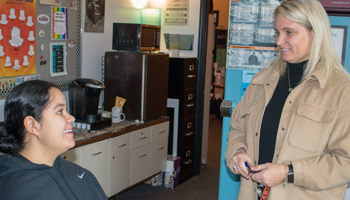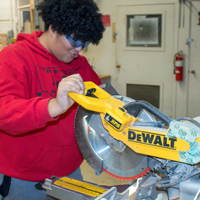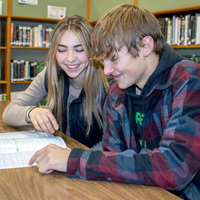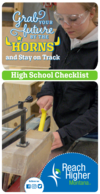Prepare for
Your Future
Education is the journey of a lifetime. Let’s get ready for your next steps.
Take the
Right Courses
Leverage the courses available to you, we'll help you get started.
Grades Make
A Difference
Keep your GPA up and watch the doors open. We will tell you why.
Volunteer
Get Involved
Volunteering has many benefits, get started and track your hours.
Start Planning Your Future

As a student, you can do a lot to start preparing for your future. Want an advantage when it comes to finding the best path after high school? Follow the points below.
Visit Your High School Counselor
Schedule time to talk with your school counselor about your goals - they love helping students!
Read MoreVisit with your counselor about these topics:
- Your education and career goals
- Taking the right courses to meet your goals
- Tips and resources to succeed in your classes
- Getting involved in school activities
- Managing your time well
Develop a relationship with your school counselor and check in on a regular basis.
Take a mental selfie
Where are you in the planning process? Write down your main goals, what you can do now to work toward your goals, as well as what you plan to do next. For instance, go visit your high school counselor tomorrow and set a goal to start volunteering by the end of the month. You got this!
Take the “Right” Courses
Learn how to leverage the courses available to you, explore your interests, and get on a fast-track to your future.
Core or More
Taking classes beyond those required to graduate from high school will better prepare you for college and career opportunities.
The Montana ACT Council suggests students take:
- 4 or more English courses
- 3 or more mathematics, natural science, and social science courses
Check with your school counselor to understand your school’s recommended courses for college and career preparation.
A list of the Montana University System College Preparatory Program requirements.
Career and Technical Education

Career and technical education classes can help you explore options in a variety of pathways, from healthcare, to business, the trades, and so much more.
In addition to taking career and technical education classes, students can participate in clubs like Skills USA, DECA, FCCLA, HOSA, FFA, and more. Through these career technical student organizations, students learn skills, compete against other students, win scholarships, and potentially earn industry-recognized credentials demonstrating proficiency in high-demand skills.
Course Options Beyond Your School
Montana Digital Academy
The Montana Digital Academy provides access to an extensive catalog of courses, taught by Montana public school teachers, and available online year-round. You can take Advanced Placement, Dual Credit, and even core credit recovery courses.
Early College Credit Options
Want to get a jump on college? You can take certain college courses while you are still in high school, and potentially earn both high school and college credit.
They say not to have regrets in life, but I do. I regret that I did not push myself hard enough in high school and I did not show up as many days as I should have.
Grades Matter! Do Your Best
Think of it this way: your grade point average (GPA) is like a mountain and at the top of that mountain are acceptance letters, scholarships, internships, apprenticeship opportunities and more.
Your GPA determines where you start your climb:
- If you have a low GPA, you start at the bottom of the mountain
- an average GPA will land you halfway up
- a high GPA will land you close to the summit.
Your level of effort is completely up to you and within your control. If you need to improve your grades, visit with a counselor or teacher to implement strategies to improve your study habits and your grades. Attendance is also important, good attendance helps you do well in high school, college, and at work. Keep showing up.
ACT/SAT Tests
The ACT and the SAT are both national standardized tests for college admissions. Juniors and seniors are the primary test takers and the tests measure students' proficiency in various areas such as problem-solving, math, writing, science, and reading comprehension. Good scores can also help you earn scholarship money. The tests cost about the same, and cover similar subject matter.
Need a do-over? You can re-take the ACT or SAT to try for a better score. Talk to your school counselor to learn more.
Building a Resume
Checklists can help you keep on the path for your future after high school. Use our handy high school checklist to stay on track.
Get Involved
Volunteer
As you transition from high school to being on your own, opportunities will arise for you to showcase your big heart and community spirit through volunteer service. There are many benefits to volunteering:
- Endorphins: It feels great to help others, and to know you are making a difference.
- Build Your Resume: Depending on how and where you volunteer, you can develop new skills and abilities to highlight on your resume.
- Earn Scholarships: Some scholarships require volunteer hours, and your time spent giving back to the community can provide the perfect story for a scholarship essay. Use our handy tracking sheet to keep track of all your hours.
College Applications: Colleges want well-rounded students who excel in and out of the classroom. Demonstrate that with your smarts, comes a big heart!
Read MoreFinding volunteer opportunities
Now that you’re interested in giving back because you’ll gain so much in return, volunteer opportunities are easy to find. Volunteering can be as easy as shoveling snow for your neighbor, or participating in an organized volunteer experience. To find local volunteer opportunities, check out:
- Your local United Way
- Your faith community
- Clubs and organizations, like 4-H, National Honor Society, or Student Council
- Your local food bank, animal shelter, or homeless shelter
- VolunteerMatch.orgis a great way to search for local and national opportunities
Pro Tip
Track your volunteer hours - you'll be glad you did when it comes to applying for scholarships and colleges your senior year. Use our handy Tracking Sheet to log the number of hours you're given back.
Clubs, Academic Teams, and Sports
Getting involved in your school community is a great way to make friends, learn new skills, and stretch your wings.
- Clubs: From foreign language clubs, knitting, diversity and inclusion clubs, and so much more, you are sure to find people who are interested in the same things that interest you. And, if you don’t find a club that meets your needs, talk to a teacher about helping you to start a new club.
- Academic teams: Speech and Debate, E-Sports, Robotics, and Drama are the perfect blend of a club and competition. Members of these teams practice throughout their season, travel to competitions, and support each other along the way.
- Sports: Whether you are a member of a team or an energetic fan, getting involved in sports is a way to show your school pride.
Time Management
Mastering time management is an art form, but you can do it – and it will pay off in nearly every aspect of your life! Knowing how to effectively manage time makes you a valuable employee, helps you accomplish tasks on time, shows teachers and coaches that you're a dedicated student or athlete, and enriches your character. Being reliable – doing what you say you will do – is a wonderful quality to have!
Read MoreFind and use a time management tool that meets your needs, like:
- An electronic calendar to manage deadlines, prioritize projects, and keep track of your commitments.
- A digital app like Todoist, which allows you to prioritize items, assign due dates, and work from a calendar.
Other tips for time management:
- Communicate if plans change. No one wants to be left waiting for someone. Running late for a meeting with your teacher or coach? Let them know!
- Schedule time to work on projects, just like you would schedule time for a dentist appointment. This ensures you’ve planned time to do the work.
- Just as important - schedule down time. Save some time for yourself, every day, to do something that brings you joy.
- Make sure you are getting enough sleep. You can’t tackle your to-do list if you are exhausted!
Find a Mentor

A mentor can be a teacher, relative, coach, community leader, employer - anyone who can help you grow as a person.
Tips for a great mentoring relationship:
- Agree on the time commitment. How often will you meet? For how long?
- Think about the topics you’d like to discuss. It could be their career journey, advice on choosing a college, or help with a particular problem you might be facing.
- Meet in a public place, like a coffee shop or a park, where both you and your mentor will be comfortable.
Mentoring is a great way to receive one-on-one coaching from someone who has been there, and wants to support you on your path to the future.
Help is Available
If you’d like some help navigating the process, we suggest the following resources:
- Reach Higher Montana Advisors provide assistance to students in smaller communities throughout Montana, with expertise in scholarships, career exploration, and the college process.
- Reach Higher Montana Summit for Youth in Foster Care provides an on-campus experience for high-school youth who have experienced life in Montana’s foster care system.
- GEAR UP is a federally-funded program serving students in 7th-12th grade in 18 middle schools and their receiving high schools to improve high school graduation and college enrollment rates.
- TRIO Programs are federally funded programs to help students overcome class, social, and cultural barriers to higher education. Programs include Educational Talent Search (middle and high school students), Educational Opportunity Centers (adult learners), Upward Bound Math and Science (high school students), Veterans Upward Bound (serving veterans pursuing college), Student Support Services (serving college students with personal, career, and academic counseling), and McNair Scholars (preparing college students for doctoral studies).
- Jobs for Montana’s Graduates (JMG) assists students to stay in school, graduate, and successfully transition into employment, college, apprenticeship, or the military.

